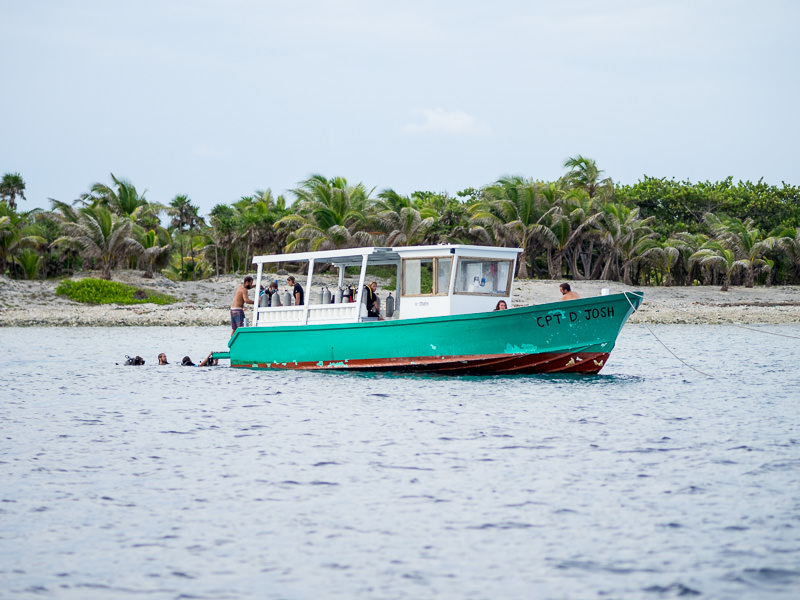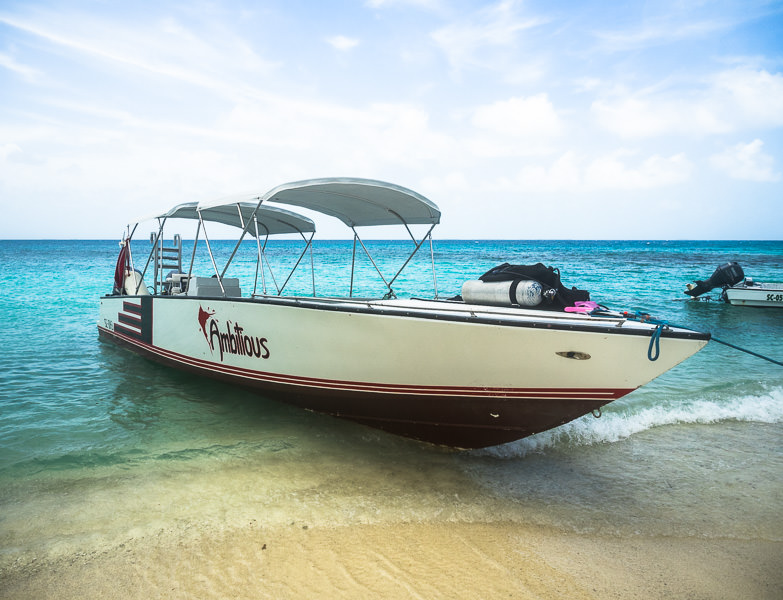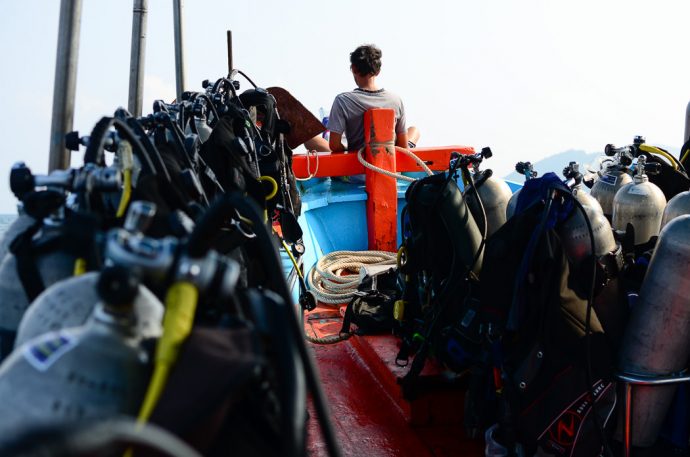Every time I go scuba diving in a new place – either for an increased level of diving certification or simply for fun dives – I go through the same tedious routine of picking a dive shop/resort with which to dive.
Yes, it’s time consuming, but it’s worth the effort every time – because when you choose correctly, you not only increase your chances of staying safe, but also your overall level of enjoyment while diving.
How To Choose A Dive Shop
My priorities for picking a dive shop in an unfamiliar place:
- Safe diving above all else. Priority number one!
- Diving with skilled (and fun) divemasters/instructors that know and love the area well
- Access to the best dive sites in the area
- Good/fair prices
- Potential free and/or discounted lodgings
The steps I go through each time I pick a dive shop with which to dive:
Step #1: Research area dive shops prior to arrival at your diving destination.
If you’ve got friends that have visited the location in which you plan to dive, ask them if they had a good or bad experience there with their dive operator. Note the names of the shops, then follow up on sites like Tripadvisor for positive and negative reviews from other divers.
Pick a few favorites from what you’ve learned. I usually start with the negative side of things in order to eliminate less reputable dive shops. Any diver’s first concern should be the safety record of a given dive shop – so if divers didn’t feel safe with their dive operator, you’ll hear about it in their reviews, generally to the tune of the below:
- Poor maintenance of dive equipment and boats, and/or notable equipment failures
- Overcrowded boats
- Willingness to take divers beyond the depth limits for which they are certified (as in, taking an Open Water diver beyond 18m depth), or on specialty dives (wreck, night, nitrox, etc) for which beginning divers are not qualified
- Impersonal service and lack of attention/credence to diver complaints about the above
Safety violations like these are a huge black eye for any dive shop and a reason to possibly eliminate them from my list of possible dive operators with which to dive. Another bad sign is if dive shops in question allow divers to touch corals and wildlife while diving. This generally means they’re not a particularly careful organization.
Once you’ve selected a few shops, check their websites for pricing and start e-mail or phone conversations to make sure their prices and terms are clear and current (often times websites are out of date) and that they respond to potential clients well.
Make a list of three to four favorite dive shops based on this process of elimination (or maybe less – sometimes there’s only one or two shops at your intended destination).

Divers resurfacing in Utila, Honduras.
Step #2: Upon arrival on location, visit your preferred dive shops in person.
I recommend a solid multi-hour scout of dive shops once you arrive on location. At minimum, visit three of your now-preferred dive shops to talk to the owners/instructors and to ask a bunch of questions, like these:
What is the TOTAL COST of diving with a given dive shop?
Every dive shop seems to do their price breakouts a little different, so make sure you understand all costs before you sign on with anyone. Questions to ask:
- Are all taxes included in listed costs of certification courses and/or fun dives?
- Does diving in said area incur reef fees? Are they included in listed costs, or are they additional?
- Is all equipment (regulator, BCD, booties & fins, wetsuit, mask, snorkel, tank itself) included in listed costs?
- Is there a discount for using your own equipment in place of rentals (if you’re carrying equipment)?
Have the person in the office write out an EXACT price of your certification course or fun dive package given your scenario. No surprises this way!
How many dive boats does the dive shop have, and how many do they send out each day?
Some dive shops only send out one boat a day. Others send out multiple boats in the morning and afternoon (and sometimes for night dives as well). Greater frequency of boat departures provides greater flexibility to you as a diver, and can help expose you to a greater variety of dive sites.
Does the dive shop have the ability to segregate advanced divers from beginners?
If you’re a beginning diver, this won’t matter much to you – but if you’re an Advanced Open Water Diver or at a higher level still, you may want to visit deeper and/or specialized dive sites that the beginners won’t be able to access. Separate boats means more flexibility, and potentially more enjoyment.
What dive sites will the dive shop be visiting in the coming days?
Most dive shops have a whiteboard calendar with listed/projected dive sites and an area for divers to sign up for dive boats. Ask to see the board and make note of what dive sites they’ll be visiting, and how frequently. If the dive shop doesn’t have listed boats for the next few days out, ask why. It could be a weather concerns, lack of divers, or equipment problems – or even just a clerical oversight.
How many other divers are currently diving with the shop, and are they completing certification courses, or doing fun dives?
If there are few other client divers at your dive shop, the dive shop will be less willing to send boats out – after all, fuel is expensive. On the other hand, if there are TOO MANY people at your dive shop, it may be harder to secure your place on a given dive boat if boats are small or limited to one per day.
Also, if everyone at a certain dive shop is a student completing a certification course, said shop might not be a great place for you as a fun diver, as the shop will likely send their boat to known sites that are good for teaching and skill acquisition instead of those known for interest, beauty and wildlife alone.
Can I see the dive equipment you use as well as the boat(s)?
While scuba equipment will look a bit alien to a beginning diver, it’s still worth eyeballing it. If they won’t show you the equipment room, or if the equipment is noticeably falling apart, that’s not a good sign. Take a look at the boat as well. Is it a boat you’d like to ride?
Is there free or reduced-cost accommodation available for divers through the dive resort?
Some dive resorts can throw you a room or dorm bed for cheap or free if you sign on for a certification course or a certain number of fun dives. Others don’t have it. Ask around, you might save a few bucks.
Can I meet the person that would be my course instructor and/or dive master?
This isn’t always possible – but when it is, it’s very helpful to speak in person. After all, your relationship with your instructor and/or dive master will be an important part of your comfort and enjoyment while diving.
Can you throw in some free “fun dives” with a certification course?
In places like Utila, Honduras, dive shops regularly throw a couple of free “fun dives” (non-certification oriented dives) with each certification course. Might as well ask if bonus dives are a possibility where you are.

The Ambitious, the diving boat we used in Placencia, Belize.
Step #3: Talk to other divers in the area.
Chances are that if you’re in a beach town or on an island, other divers are in the same place for the same reason. Strike up a conversation and ask a few questions, like these:
What dive shop are they diving with?
And do they like their dive shop(s), or have reservations? A strong personal recommendation is quite helpful in an unfamiliar place.
Did the shop offer them discounts and/or free or reduced cost accommodations?
Might as well ask, and try to match or beat their deal.
What are the best dive sites they’ve encountered nearby?
Make note of the names, and compare them to where the local dive shops are planning to visit over the next few days.
Additionally, figure out how deep the notable sites are. No use in getting excited about a dive site at 25 meters depth if you’re only certified to 18 meters (of course, you could always up your certification to go deeper).
And thank your fellow divers, of course – you might end up on the dive boat with them.
Step #4: Choose A Dive Shop!
I usually gather information and then sleep on it before picking a dive shop. But if you don’t have the time to do so, just make a call that you feel comfortable with, based on the below:
- General reputation and safety record of dive shop via conversations and research
- Price! Diving costs on balance with potential free/discounted rooms and other incentives like free fun dives
- Accessibility of great dive sites, and frequency of boat departures to preferred sites
- General gut feeling. Make a choice with which you feel at peace.
As for me: I’m a PADI-certified Rescue Diver and have diving experience in Thailand, India, Belize, Honduras and Nicaragua. Thanks for reading!







